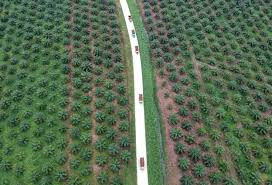It's an issue between Indonesia, together with Malaysia, against the environmentally conscious European Union (EU) that had been percolating for some time because the bloc is stopping imports of palm oil for biofuel because its mass production causes mass deforestation.
The EU discovered that cultivating palm oil has caused 70% of land cleared compared to just 4% for corn and soybeans.
Indonesia Statistics Agency (BPS) says the oil plantation in 2017 was at 11.9 million hectares. This is three times bigger 17 years before that.
Indonesia and Malaysia are the world's largest producers of palm oil with 2-3% of Indonesia's gross domestic product (GDP) coming from this commodity.
Palm oil and palm kernel oil-based ingredients are in almost half of the products on supermarkets from food to non-food items like frying oil, snacks, personal care products, and cosmetics.
It's also used for biofuel and energy, animal feed, pharmaceutical, and industrial sectors.
In March, there had been the EU's restrictions on the EU members' use of palm oil for its renewable-energy goals.
It states that by 2020, member states must have at least one-tenth of its fuel consumption coming from renewable fuels, sans palm oil-based products.
By 2030, the EU will stop all palm oil imports.
Adding fuel to the fire was when EU announced an 8% to 18% tariffs this August 14, on subsidized palm oil imports from Indonesia after an investigation found Jakarta's subsidies for domestic producers lead to "a threat of material injury" to European companies.
The tariffs are to give protection to European biofuel companies who got affected when the EU removed duties on Indonesian imports last year upon orders of the World Trade Organization (WTO).
The provisionally re-imposed tariffs will end until December but could go on for five more years.
Jakarta threatened to increase tariffs on EU dairy imports from 5-10% to 20-25%.
Enggartiasto Lukita, Indonesia's trade minister, was quoted saying that if what the EU "imposes" is not fair, "then that is an act of protectionism and trade war."
Indonesia and Malaysia are thinking about a joint response action.
Malaysian Prime Minister Mahathir Mohamad told the Nikkei Asian Review on August 19 that the two countries are still "thinking about" bringing this situation to the International Court of Justice.
The two countries already spoke to the WTO over this phasing out saying it is "discriminatory."
Indonesia claims this move is to favor European-made vegetable oils.
Mahathir added that since this is world trade, "If it breaches any international law" then "we will go to the international court."






